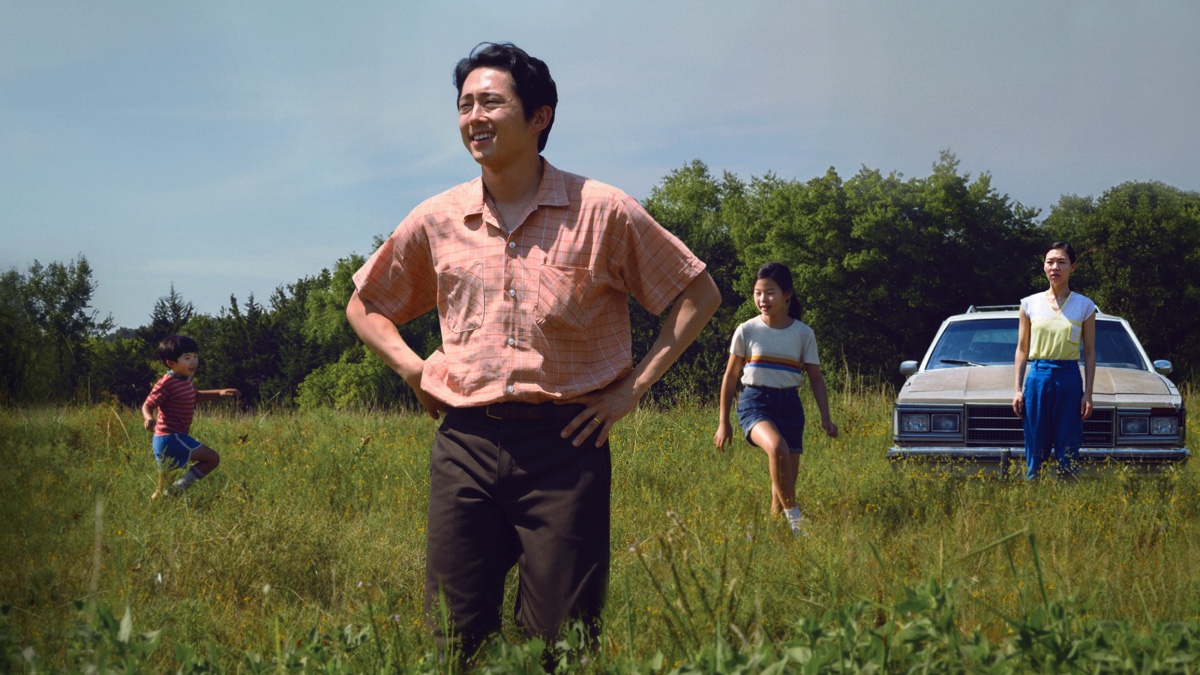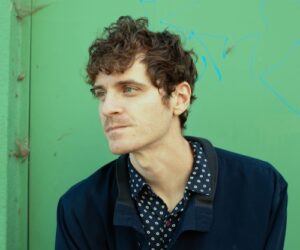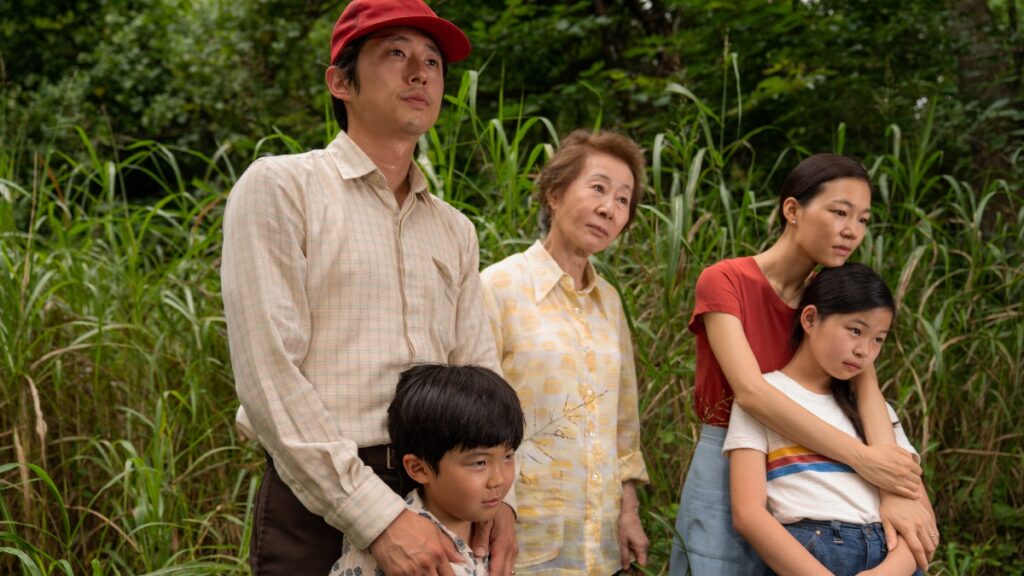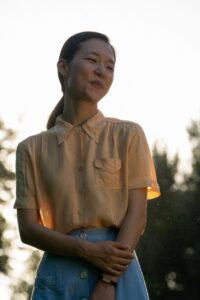
Every musician and composer has a different journey on their path to scoring for films and television, which is why there’s so much range and variety in the types of music used to embellish the sound and visuals of the media we consume. That’s particularly the case with Lee Isaac Chung’s Minari, a deeply personal semi-autobiographical film about the filmmaker’s own childhood as the son of Korean immigrants trying to make their way through farming in a rural area of America. The movie stars Steven Yeun and Yeri Han as the parents of young David (Alan S. Kim) and Anne (Noel Cho) whose extended family is joined by their quirky alcohol enthusiast Granny (Yuh-jung Youn). The movie has been receiving accolades ever since it premiered at Sundance in 2020.
To create the compelling music that enhances the film’s multitude of emotions, Chung called upon Emile Mosseri, who had previously scored The Last Black Man in San Francisco. Compared to other film composers, Mosseri is relatively new, having been working in that field for less than a decade, but he’s definitely made a mark for himself, not only with Last Black Men but also working with Miranda July, doing the music for her 2020 release, Kajilllionaire.

Below the Line spoke with Mosseri last week over the phone to find out what went into making Minari’s score so evocative and original.
Below the Line: I assume you’re a band guy, so how did you transition into composing for film?
Emile Mosseri: Yeah, I grew up playing in bands, and I still do. I had basically been in one band for most of my life, but all the while scoring films for friends and things like that. And then, about three years ago, there’s a guy that made a music video for my band, a guy named Terence Nance. I’d scored some of his films, and he made a video for my band, and he got a show picked up by HBO. I was one of the composers that worked on that show, and from there, I got introduced to some more people out in LA and started scoring films more heavily, but I’ve been writing music for films for the last 10 and 15 years.
BTL: What was your main instrument with the band?
Mosseri: I played bass and sang in this band. And did moves, dance moves and bass and singing.
BTL: Do you play other instruments as well?
Mosseri: Yeah, I grew up playing piano and playing guitar and bass and singing and writing songs and learning songs on the piano. So I think I write mostly on the piano.
BTL: You mentioned before that you’ve done some other music before Terence asked you to score something, so what were you doing before? How did you get involved with that? Did you just know filmmakers in New York or out there?
Mosseri: Yeah, just various filmmakers, a few people that Terence had introduced me to. I started writing music for Terrance in 2012, and then his show got picked up in 2018, but I’d scored some short films for him and other collaborators of his and few other people over the years when I wasn’t on the road, a couple indie features and a bunch of shorts and then it wasn’t until I moved out here and Random Acts of Flyness, Terence’s show, was on the air that I started getting plugged into the film scene more heavily.
BTL: I’ve spoken to a bunch of composers, and I’ve heard similar stories that they were in bands and then they move to L.A. and all of a sudden, there’s so much more work, I guess because there’s so much demand out there.
Mosseri: Yeah, there’s a lot of people working in this field out here, and it helps to get plugged into it. It helps to be out here.

BTL: Last year, you had two amazing movies. Working with Miranda July alone is pretty amazing, but then Minari is one of my favorite movies. I want to focus on that, so how did you hook up with Lee Isaac Chung to score that?
Mosseri: I met Isaac actually at the LA premiere of The Last Black Man in San Francisco, which is another film I had scored. My friend, Christina Oh, had produced that film, and she also produced Minari, so she had sent me Isaac’s script. She came over to the studio and told me about his film and how excited she was about it. She wanted to see if I was interested in meeting him, and she sent me his script, and she sent him some of my music. In time, I’d read his script and fallen in love with it and then met him. Then we went out for lunch, and we talked about a movie and the music, and we kind of took it from there.
BTL: Had he shot any of that at that point or was this before he had even filmed?
Mosseri: Just before he filmed. This must have been in June 2019, and then I started writing music right away. I wrote most of the music before they started shooting, and they shot in July and August.
BTL: So they must have turned it around pretty fast for Sundance.
Mosseri: For Sundance, exactly. Yeah, they come fast and furious these Sundance deadlines, you know. They’ll come get you.
BTL: What were some of the early conversations like with Isaac? I also like to ask composers about this: How much musical knowledge did he have in terms of communicating what he wanted? Some directors have more musical background than others.
Mosseri: Yeah, everyone’s style is different. Every director I’ve worked with has a different style when it comes to music. He was incredibly trusting and incredibly generous as a collaborator, and gave me a lot of room to explore, but he completely knew what he wanted emotionally. He knew what he wanted the music to do emotionally. I think there was no specific direction really given stylistically in what we wanted the score to sound like it was more just how it was going to feel, how it was going to be tucked into the heart of the film. We found it just through exploration. I would send him music and see what resonated with him.
BTL: Did the actors have music to listen to while they were on set or shooting?
Mosseri: They did, yeah, they did. I remember it was important to me that I’d sent the music before they started shooting. I’d met him just right before that time, so before we even finished the contract or whatever for the officially me working on the film, I was sending in music because I wanted them to have it in hand on set, and then he drive around Tulsa listening to the sketches and play them for Stephen and Yeri and everybody in Laughlin. It was really an amazing experience to just have the music come as part of this process was a first for me. My wife and I went down to the set. I was just involved in an earlier stage in this film than I had in the past, which was a real treat.
BTL: You can really tell though because the music and the performances really integrate and gel well. It would be so different without the music, almost as if they’re performing to the music if that’s possible.
Mosseri: Oh, thanks, man. That’s awesome to hear that it’s landing that way, that it’s translating. I think when they have the music on hand, it helps it become a bigger part of the film, and it proves useful in that way as far as tone. I think it kind of goes both ways. The music can help inform the tone or the way that they’re shooting a film, and then in turn, their performances are inspiring me to write more music. It’s a beautiful part of the collaboration, just kind of passing the ball back and forth and keeping the inspiration going.
BTL: I’m curious about the instrumentations, because they’re truly unique, because even when you’re doing stuff on piano or acoustic guitar, it’s always sonically interesting. The way you used reverb and FX, so I assume you’re engineering and producing everything yourself pretty much?
Mosseri: I am, yeah, for the most part. For the album, I worked with a great mixer named Frank Wolf, who mixed the music in 5:1 surround sound for the movie theaters.
BTL: Well, they’re opening in New York on Friday so maybe A24 will put the movie in some of them.
Mosseri: Is that right? Oh, wow. If they put it in some theaters, that would be great. Are people going?
BTL: I guess we’ll find out next week. You’re mixing in 5:1 and lots of people have good home theaters where they can listen that way, but at least you got to watch it with an audience at Sundance, which is a lot more than some people who had movies last year.
Mosseri: That’s true. Yeah, I’m incredibly, incredibly grateful for that, to be able to sit in a theater with a bunch of people watching something together. I’m grateful that we got to snag that experience right before the world shut down.

BTL: I wanted to ask about doing two songs with Yeri. Was that something that came out before you started filming?
Mosseri: No, that came together very quickly towards the end of the process, right before the mix. What had happened was we were talking about what the music was going to be during the end credit crawl, and I’d written a few suites that we tried some things out, and it didn’t feel quite right. Then I had written a song in English and sang it and sent it to Isaac in proposing this idea of a song. We were trying to figure out if it could be translated into Korean. The song was written from the melody of a piece of music that actually opens up the entire film, so the first cue in the film– it’s called “Big country” — it’s the same melody as “Rain Song.”
So the idea was that we would bookend the film with the same melody and it would be this sort of childhood memory piece in the beginning, and then it would be fully realized as a song at the end. It was just one of those things where the stars aligned, and it worked out beautifully like that. Yeri, who stars in the film is Monica, has this incredible instrument, has this beautiful voice, and she lent her voice to the song, and she would send us versions of it from Korea. My friend Stephanie Hong is a brilliant lyricist and a poet, who took my song and translated it and wrote a new poem in Korean for her to sing. She would send in the vocal tracks from Korea, from Yeti to us, and then we would we put them in a song right before we were up at Skywalker mixing the film, and then it ended up being this kind of lullaby from the mother’s perspective to the son. It was one of those things that just worked out, and I’m grateful for it. It felt like it just kind of effortlessly and gracefully came together.
BTL: Is she a singer or a recording artist in Korea?
Mosseri: She’s a multifaceted, super talent. She’s an amazing artist. She was a dancer first, so she’s an incredible dancer who studied in like Korean traditional folk dance and then she she’s an incredible actor, obviously, and an amazing singer. So she’s triple threat.
BTL: This was done a year ago for Sundance, so have you been working on anything else since. I feel like musicians have a bit of an advantage working remotely.
Mosseri: Yeah, exactly. I’ve been working on my record, and then I have another record with another composer that that I’m working on. And then there’s a couple film projects with past collaborators, and just trying to stay busy, trying to stay sane, and stay productive.
BTL: Are the people coming to you now have generally seen Minari or The Last Man in San Francisco and want something similar or are you finding you can change things up and do different things for each project.
Mosseri: I find that I’m able to do different things for each project. It’s also about choosing the projects that lend themselves to that, to taking the music to new places and making sure you’re not repeating yourself, but still trying to have a thread. That’s the balance. That’s the tricky thing.
BTL: Have you had the thing where someone calls you and they’ve used your music from another movie as temp music for something they’ve already cut together? Or have you been able to avoid that?
Mosseri: Yeah, I have a little bit actually, funnily enough, with Minari. They had used mostly my sketches from Minari to temp, but then a couple of things from Last Black Man, which was hard because my association with that music is so strongly fastened to that film, that it’s a challenge when they temp with your stuff, but also, if my music is getting temped in other films, that’s an honor. It’s always hard with any temp music to try to knock a piece of music off the mountain, but if it’s your own music, it’s somehow even harder or more of a brain scrambler.
Minari is now available to watch in select cities and possibly on some digital platforms, as well.
All photos courtesy of A24 except where noted.





